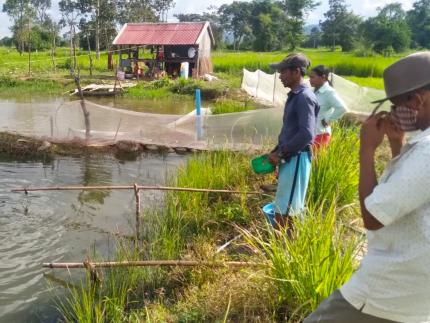Renewed Hope in Challenging Times

In July 2021 the United Nations reported that there was a dramatic worsening of world hunger in 2020, and officials speculated that much of it was likely related to the COVID-19 pandemic.
Indeed, the restrictions put in place to slow the spread of the virus disrupted food supply chains and caused food prices to skyrocket, putting added strain on households already struggling with income instability. Added to that was the loss of income-earning opportunities, especially for daily wage workers, so it is not surprising that food security became more and more out of reach for the world’s most vulnerable families.
World Renew Asia regional director Ruairidh Waddell explained, “In places like Bangladesh, India, and Cambodia, the bulk of the people are daily wage earners who rely on $1.50 a day, and they need that daily income to survive. What we saw with the COVID-19 pandemic was multiple lockdowns and the inability for people to get that $1.50 a day.”
Adding to the struggles of families not only in Asia but across the globe, changing weather patterns made it increasingly difficult for farmers to reap successful harvests.
“What I see in Asia is the intersectionality of many different challenges,” Waddell said, “the primary ones being COVID-19 and the impact that climate change is having on the places where World Renew works.”
As the pandemic continues to affect our world and climate change continues to rob farmers of their crops, is there anything that can be done to protect vulnerable families from slipping deeper into food insecurity?
Yes. From providing training in climate-adaptive practices to teaching smallholder farmers about better ways to store their produce, World Renew has worked for decades to equip communities with training and tools not only to become food secure but also to become resilient in the face of unexpected emergencies—such as pandemics and natural disasters.
For Snguon Touch, who lives with his wife and their five children in Kampot province, Cambodia, returning to farming and embracing new techniques helped his family to navigate the challenges presented by the COVID-19 pandemic.
Prior to the pandemic Touch practiced traditional farming methods but did not earn enough to meet his family’s basic needs. To supplement their income, he found employment as a construction worker in a distant village, and for six years he sacrificed living with his family for income stability.
But when the COVID-19 virus began to spread, Touch decided to return home. Though he was able to find odd jobs, he soon found the income unreliable and insufficient to meet his family’s needs.
Then he joined an agricultural program facilitated by World Renew’s local partner, OREDA, and he quickly learned new farming techniques. With renewed hope, he experimented with growing vegetables and raising chickens, and he became an expert in sustainable fish farming. He also produced fish feed from local flora and fauna. Today, Touch operates three fish ponds, and he harvests several species. He earns up to $1,350 USD every three to five months: more than enough to meet his family’s needs.
“Mr. Touch’s success validates World Renew Asia’s emphasis on tried-and-true methods of helping communities to journey away from poverty,” said Waddell.
To regain lost ground in the fight against global hunger and to prevent more families from sinking into food insecurity, World Renew is raising funds for the Global Food Crisis. Donations will be used to reach more vulnerable communities and to continue to support the communities where this work has started.
To learn more, visit worldrenew.ca/global-food-security.


